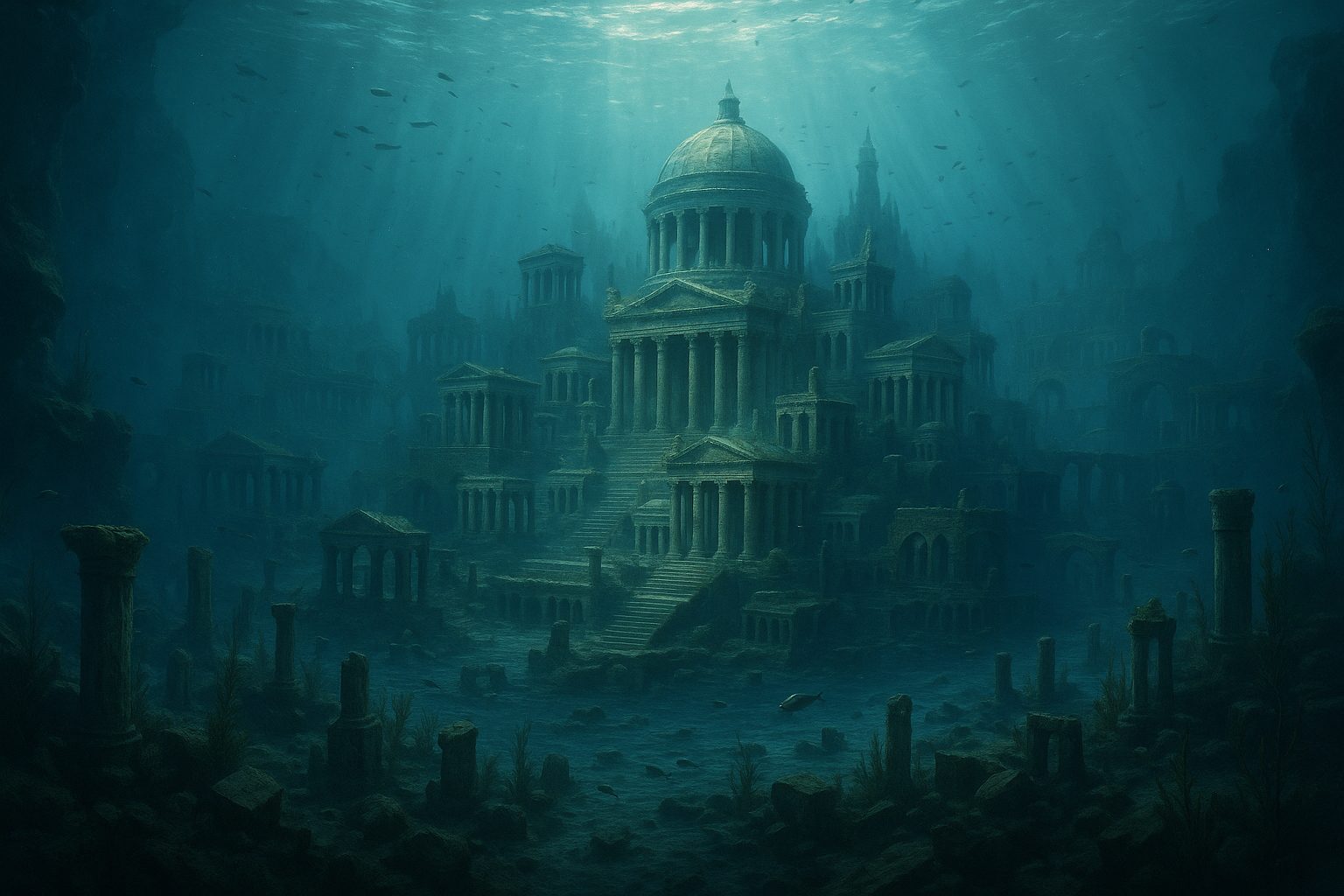Atlantis: The Ancient Mystery That Changed How We Explore Our World

Before we dive into today's post: This exploration of the lost city of Atlantis is a sample of what you'll discover when you listen to 10 Minute Mystery. Each episode delivers fascinating unsolved cases, historical enigmas, and puzzling disappearances in bite-sized segments perfect for your commute or coffee break. If you enjoy unraveling mysteries like this one, subscribe to 10 Minute Mystery wherever you get your podcasts.
The Lost City of Atlantis: A 2,400-Year Quest for the Perfect Civilization
A Greek philosopher writes about a perfect civilization that gets destroyed in a single day. Scholars spend the next 2,400 years combing ocean floors, analyzing satellite images, and funding expeditions to find it. Most experts think it was just a story, but the evidence isn't as cut and dried as you might expect. Today, we're diving into the mystery of Atlantis and what our fascination with finding it reveals about the power of human curiosity.
Here's what happened: A Greek philosopher told a story about a lost civilization, and we've been captivated by it ever since.
For 2,400 years, explorers have drained their savings searching for Atlantis. Archaeologists have built careers on it. Tourist boards have marketed it. And all because Plato mentioned it twice in his writings.
Today we're going to explore what actually happened here. Why this story has such staying power. And what our quest to find a perfect lost civilization tells us about ourselves.
The Birth of a Legend
Athens, 360 BCE. Plato is teaching at his Academy when he writes two dialogues called Timaeus and Critias. In them, he tells the story of Atlantis through the character of Critias, who claims he heard it from his grandfather, who heard it from the statesman Solon, who heard it from Egyptian priests.
The chain of sources spans generations, but the details Plato provides are remarkably specific.
According to his account, Atlantis was a naval superpower that existed 9,000 years before his time. That would place it around 9,600 BCE. The civilization sat beyond the Pillars of Hercules, what we call the Strait of Gibraltar today.
This wasn't some primitive society. Plato described ten kings ruling over concentric rings of land and water. They had advanced engineering, including hot and cold running water. They mined a mysterious metal called orichalcum. Their capital city was a marvel of urban planning with alternating rings of land and sea, connected by bridges and tunnels.
But here's the turning point: these people got comfortable. Then they got corrupt. Their noble nature degraded, Plato wrote, weakened by human frailty. So Zeus decided to punish them. In a single day and night, the entire civilization vanished beneath the waves.
The story works perfectly as a cautionary tale about political corruption and moral decay. Many scholars believe that's exactly what Plato intended.
But readers have spent centuries wondering: what if there was more to it than that?
The Archaeological Gold Rush
If Atlantis existed, where would we find it? This question has launched expeditions across the globe, each one following compelling clues.
The strongest candidate is Santorini, Greece. Around 1600 BCE, a massive volcanic eruption devastated the island, burying the advanced city of Akrotiri under layers of ash. The Bronze Age Minoan civilization that lived there had sophisticated plumbing systems and extensive trade networks. When the volcano erupted, their society collapsed almost overnight.
The parallels are striking. Advanced technology, maritime power, sudden destruction. There's a timing discrepancy: Plato placed Atlantis 9,000 years before his time, while the Minoan collapse happened only 1,000 years earlier. But some researchers suggest this could be explained by translation errors or symbolic dating.
Another compelling theory points to southern Spain. Researchers studying the Doñana Marshes near Cadiz have found satellite images showing circular structures that match Plato's description. Some believe these are remnants of temples and harbor walls. The location fits Plato's account of a civilization beyond the Pillars of Hercules.
The marshes present archaeological challenges, but ground-penetrating radar and other technologies continue revealing intriguing formations beneath the surface.
Other locations have captured serious attention. The Azores in the mid-Atlantic appeal to those who take Plato's ocean placement literally. The Bahamas' Bimini Road features underwater limestone formations that some interpret as ancient harbor walls. A few researchers have even proposed Antarctica as a temperate pre-ice age Atlantis, supported by theories about crustal displacement.
Each theory brings dedicated researchers who spend years analyzing evidence, organizing expeditions, and pursuing leads. The passion driving these searches reflects genuine scientific curiosity, even when the conclusions remain disputed.
The Science vs. The Mystery
When scientists apply rigorous methods to Atlantis claims, the results create more questions than answers.
The geological evidence presents challenges. Modern understanding of plate tectonics suggests continents don't simply sink into the ocean. They're supported by less dense crustal material that floats on the Earth's mantle. For Atlantis to disappear as Plato described would require geological processes that aren't well understood within current models.
But geology continues evolving. New discoveries about underwater landmasses, sea level changes, and crustal movements regularly challenge previous assumptions. What seemed impossible decades ago sometimes becomes plausible with new data.
The archaeological record offers its own puzzles. An advanced Bronze Age civilization would have left extensive material traces. Despite decades of underwater archaeology and ground-penetrating radar surveys, no site has yielded definitive evidence of Plato's Atlantis. But absence of evidence isn't evidence of absence, especially when we're dealing with oceanic depths and thousands of years of geological change.
Scientists have identified what they call the "Atlantis Effect": the tendency for confirmation bias to affect interpretation of findings. When researchers are convinced they've found Atlantis, they may unconsciously interpret ambiguous evidence to support their theory. But this same bias can work in reverse, causing researchers to dismiss potentially significant findings because they don't fit established models.
The burden of proof remains high for extraordinary claims. But extraordinary claims sometimes prove true, especially in archaeology where new technologies regularly reveal previously hidden civilizations.
The scientific method has revealed genuine mysteries that keep the Atlantis question alive. Post-glacial flooding did submerge coastal civilizations as ice ages ended. We continue discovering advanced ancient societies that challenge our assumptions about the past. The search for Atlantis, even when unsuccessful, has contributed to our understanding of ancient trade networks, Bronze Age technology, and geological processes.
The Cultural Phenomenon
Here's what's intriguing: no Greek historian mentions Atlantis outside of Plato's dialogues. No other ancient source corroborates the story. Yet it has become embedded in Western culture like few other ancient tales.
This could mean Plato invented the story entirely. Or it could mean he was drawing on sources that didn't survive, oral traditions that were lost, or knowledge that was deliberately hidden.
The story took on new dimensions in the 19th and 20th centuries. Helena Blavatsky's Theosophy movement claimed Atlanteans were an advanced spiritual race. Edgar Cayce's psychic readings described Atlantean crystal technology and predicted the civilization's ruins would be discovered in the 1960s. While that specific prediction didn't materialize, underwater archaeology was still in its infancy then.
Modern research has expanded the possibilities. Ancient astronaut theorists connect Atlantis to extraterrestrial contact. Alternative historians link it to other potential lost civilizations. The internet has democratized Atlantis research, with amateur investigators sharing discoveries and theories across global networks.
The economic impact is substantial. Tourism industries in Greece, Spain, and the Bahamas promote their Atlantis connections. Books, documentaries, and movies continue generating revenue from our enduring fascination.
But the deeper appeal is psychological. Atlantis represents the possibility that humanity has achieved greatness before. In our era of environmental challenges and social upheaval, Atlantis offers both warning and hope. It reminds us that civilizations can fall, but also that human ingenuity has created wonders we're still trying to understand.
We're drawn to Atlantis because we want to believe we're not the first generation to face these challenges, and we won't be the last to overcome them.
The Continuing Search
The scholarly consensus suggests Atlantis was Plato's fictional creation, designed to illustrate philosophical arguments about political corruption and moral decay. The specific details weren't historical facts but literary devices to make his points more compelling.
But consensus in academia has been wrong before. New discoveries regularly reshape our understanding of ancient history.
The search continues with new intensity. Modern technologies have revolutionized the hunt. Satellite archaeology reveals previously hidden structures. Deep-sea exploration capabilities expand our reach into oceanic depths. Ground-penetrating radar can detect buried cities without excavation. LiDAR technology strips away forest cover to reveal ancient settlements.
Each technological advance brings new possibilities for discovery. And that hope has produced unexpected benefits. Expeditions looking for the lost city have contributed to legitimate archaeological discoveries. Underwater surveys have revealed ancient shipwrecks and submerged settlements. Research into Bronze Age trade networks has expanded our understanding of ancient civilizations.
Even unsuccessful attempts to find Atlantis have advanced our knowledge of geology, oceanography, and ancient history.
Meanwhile, real ancient mysteries continue emerging. The Bronze Age collapse around 1200 BCE devastated Mediterranean civilizations for reasons we still don't fully understand. The Sea Peoples launched mysterious campaigns that toppled empires. Göbekli Tepe in Turkey suggests sophisticated Stone Age societies existed earlier than previously thought. Underwater cities off the coasts of India and Japan hint at civilizations lost to rising seas.
These genuine puzzles offer the same intellectual excitement as Atlantis, with the advantage of physical evidence we can study.
The future of Atlantis research will likely follow multiple paths. Academic archaeology will continue applying rigorous scientific methods to ancient sites, occasionally finding connections to Plato's story. Popular researchers will continue embracing the mystery, using new technologies to explore previously inaccessible locations. Citizen scientists will contribute through satellite analysis and crowd-sourced research.
Whether Atlantis was real or not, our 2,400-year fascination with finding it reveals something fundamental about human nature. We are natural explorers, driven by curiosity and hope. We want to believe that we are not the first to achieve greatness, that somewhere in our past lies a civilization that overcame the challenges we face today.
Atlantis serves as a mirror, reflecting our values, fears, and aspirations. The search for it has taken us to ocean depths and heights of imagination. It has inspired scientific discoveries and artistic creations. It has reminded us that the most enduring mysteries often reveal as much about the seekers as the sought.
As long as humans dream of lost golden ages and perfect civilizations, Atlantis will continue calling to us from beneath the waves. Plato may have intended it as a cautionary tale about political corruption, but he created something larger: an eternal symbol of human potential and the mysteries still waiting to be discovered.
The search for Atlantis continues. And our persistence in that search might be the most human trait of all.




